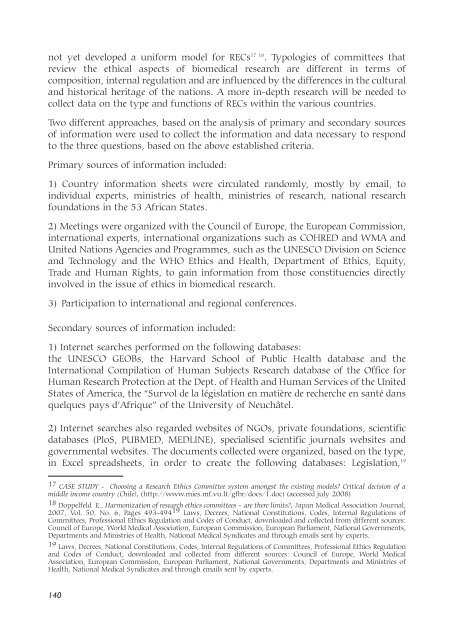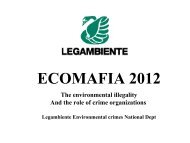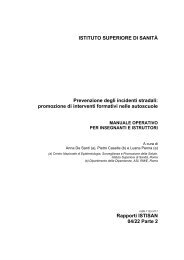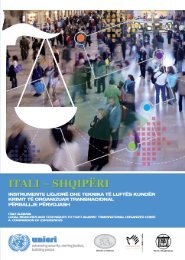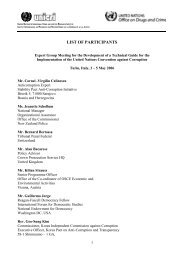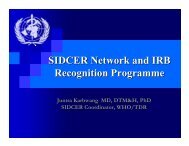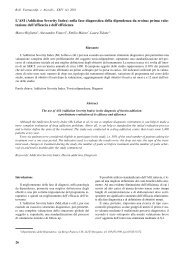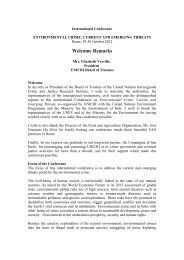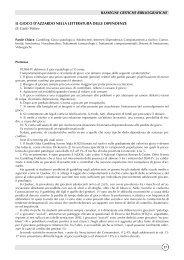Biomedical Research in Developing Countries - UNICRI
Biomedical Research in Developing Countries - UNICRI
Biomedical Research in Developing Countries - UNICRI
You also want an ePaper? Increase the reach of your titles
YUMPU automatically turns print PDFs into web optimized ePapers that Google loves.
not yet developed a uniform model for RECs 17 18 . Typologies of committees that<br />
review the ethical aspects of biomedical research are different <strong>in</strong> terms of<br />
composition, <strong>in</strong>ternal regulation and are <strong>in</strong>fluenced by the differences <strong>in</strong> the cultural<br />
and historical heritage of the nations. A more <strong>in</strong>-depth research will be needed to<br />
collect data on the type and functions of RECs with<strong>in</strong> the various countries.<br />
Two different approaches, based on the analysis of primary and secondary sources<br />
of <strong>in</strong>formation were used to collect the <strong>in</strong>formation and data necessary to respond<br />
to the three questions, based on the above established criteria.<br />
Primary sources of <strong>in</strong>formation <strong>in</strong>cluded:<br />
1) Country <strong>in</strong>formation sheets were circulated randomly, mostly by email, to<br />
<strong>in</strong>dividual experts, m<strong>in</strong>istries of health, m<strong>in</strong>istries of research, national research<br />
foundations <strong>in</strong> the 53 African States.<br />
2) Meet<strong>in</strong>gs were organized with the Council of Europe, the European Commission,<br />
<strong>in</strong>ternational experts, <strong>in</strong>ternational organizations such as COHRED and WMA and<br />
United Nations Agencies and Programmes, such as the UNESCO Division on Science<br />
and Technology and the WHO Ethics and Health, Department of Ethics, Equity,<br />
Trade and Human Rights, to ga<strong>in</strong> <strong>in</strong>formation from those constituencies directly<br />
<strong>in</strong>volved <strong>in</strong> the issue of ethics <strong>in</strong> biomedical research.<br />
3) Participation to <strong>in</strong>ternational and regional conferences.<br />
Secondary sources of <strong>in</strong>formation <strong>in</strong>cluded:<br />
1) Internet searches performed on the follow<strong>in</strong>g databases:<br />
the UNESCO GEOBs, the Harvard School of Public Health database and the<br />
International Compilation of Human Subjects <strong>Research</strong> database of the Office for<br />
Human <strong>Research</strong> Protection at the Dept. of Health and Human Services of the United<br />
States of America, the “Survol de la législation en matière de recherche en santé dans<br />
quelques pays d’Afrique” of the University of Neuchâtel.<br />
2) Internet searches also regarded websites of NGOs, private foundations, scientific<br />
databases (PloS, PUBMED, MEDLINE), specialised scientific journals websites and<br />
governmental websites. The documents collected were organized, based on the type,<br />
<strong>in</strong> Excel spreadsheets, <strong>in</strong> order to create the follow<strong>in</strong>g databases: Legislation, 19<br />
17 CASE STUDY - Choos<strong>in</strong>g a <strong>Research</strong> Ethics Committee system amongst the exist<strong>in</strong>g models? Critical decision of a<br />
middle <strong>in</strong>come country (Chile), (http://www.mies.mf.vu.lt/gfbr/docs/1.doc) (accessed july 2008)<br />
18 Doppelfeld E., Harmonization of research ethics committees – are there limits?, Japan Medical Association Journal,<br />
2007, Vol. 50, No. 6, Pages 493-494 19 Laws, Decrees, National Constitutions, Codes, Internal Regulations of<br />
Committees, Professional Ethics Regulation and Codes of Conduct, downloaded and collected from different sources:<br />
Council of Europe, World Medical Association, European Commission, European Parliament, National Governments,<br />
Departments and M<strong>in</strong>istries of Health, National Medical Syndicates and through emails sent by experts.<br />
19 Laws, Decrees, National Constitutions, Codes, Internal Regulations of Committees, Professional Ethics Regulation<br />
and Codes of Conduct, downloaded and collected from different sources: Council of Europe, World Medical<br />
Association, European Commission, European Parliament, National Governments, Departments and M<strong>in</strong>istries of<br />
Health, National Medical Syndicates and through emails sent by experts.<br />
140


